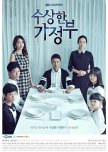
Profound, idiosyncratic mixture of different genres, coherently combined to form a new whole
The story is surprisingly exciting and complex, with an inscrutable main character and her mysterious past. Basically it's a thriller. At the same time, however, the story also offers plenty of food for thought and/or empathy about modern educational concepts. In any case, the story falls outside the scope of the usual KDrama stuff. On the side, one also gains some impressions of life in the middle class, of the difficulties of single parents (although men have it a bit better than women), of bullying at schools or of abusive parents-in-law.A central storyline revolves around the now: the employment of Park Bok-nyeo in a family with a single father and 4 children who are dealing with their traumatic recent past - the suicide of the mother/wife. The second central plot line works in the background and deals with Bok-Nyeo's own traumatizing past, which shapes her behavior to this day. It is inevitable that both strands eventually become entangled.
Choi Ji-woo marvelously represents the housekeeper Park Bok-neyo. She fulfills her tasks calmly, patiently and disciplined. Always clearly demarcated without ever pulling a face (in 20 episodes)! (Ok, maybe once...) However she can hide well behind her role as a housekeeper and like that escape her own inner emptiness, as she herself is emotionally broken and limited in her ability to relate. Her own traumatic past is now catching up with her and threatens to turn her current life upside down again. But she is older by now, more mature and thus she tries to face her fate emotionally strengthened and resolutely and prepared to get over it to some extent. In the process eventually she offers a variety of psychologically and pedagogically valuable interventions in the everyday life of all family members. It's not all cliché, but offers touching, funny and very serious moments.
So this is not a love story. "Suspicious Housekeeper" offers an idiosyncratic mixture of different genres that are coherently combined to form a new whole with a surprisingly profound entertainment value. All actors, up to the 4 kids, contribute to the living impression of the overall work of art.

Here the heroes individually are insignificant, helpless. Together they can make a difference.
"Falsify" (also "Distorted") tells an exciting story about the business with official truth. I think this works particularly well as the KDrama offers a critical examination of the rather difficult concept of 'truth', which can be bent and manipulated depending on the eye of the viewer. Is the rule of law just a pretty farce? Rather an eloquent backdrop for the mighty who operate in the shadow? Does actually anything like justice exist? What truth are we hearing? Which one do we want to hear? Which preferably not? Is it always so good to bring the truth to light?Regarding the recently common term 'lying media', used as an accusations from all different directions, "Falsify" offers a burning issue. Also a bit of an 'Watergate Affair' in South Korean garb (as the underlying case resembles some real South Korean one). Sophisticated journalism and sensation-hungry tabloids, public prosecutors and lawyers as law enforcement officers, so called respectable (yet cheating) businessmen as well as gangs are all frighteningly close together. Against this background, seldom has sich wide range of positions, attitudes and motivations been thus successfully intertwined and presented close to touch on the basis of individual fates, altogether mixed up in an exciting story. Abysses open up in view of social ideals and their illusions. And yet hope is not lost in the face of (quite deadly) superiority.
This is definitely not a ´Marvel´-like (super)hero story. Here the 'heroes' individually are insignificant, inconspicuous, fallible, and to some extend helpless puppets in a complex mechanism that is controlled by opaque forces. However, together they can make a difference in co-creation - by bundling their potentials, throwing their prejudices overboard, getting involved with each other, learning to trust each other (despite initial contempt), and no longer reflecting on what separates them. The key is a unifying idea that is bigger than each individual (with their physical, emotional or social needs). They want to give this idea shape, body, weight and charisma with all imaginable creative means. This cross-personal idea is what gives them strength (even in the face of massive personal threats) and overcomes fear. Here it is the idea of a democratic constitutional state in which there is justice for ALL; in which ALL are equal before the law; in which every citizen can/must bear responsibility for his/her actions - the price for the freedom of responsible citizens: a minimum consensus of laws, rights and obligations that are binding and binding for everyone.
This idea sounds nicer and more promising than it really is, because it usually stays with the idea that is trampled on behind the scenes. Yet, it is (real) people who fill this (abstract) idea with life. But where there are people, there are also their corruptibility, their greed, their vulnerability to blackmail and their cowardice, as well as the fitting people to unscrupulously exploit such weak points. South Korea's young democracy and long history of corruption and mighty ones operating in the shadow offers a realistic, scandal-ridden environment to process this exciting and at the same time outrageous KDrama - thus offering a wide range of gray tones, emotionally differentiated and authentic.
By following various protagonists from the press and the courts, the story begins with individual threads of action that are at best loosely connected to one another, but which become entangled over the course of the story and together form a strong strand that everyone can pull on together. So a bit of patience is required from the audience, but it pays off! The differently motivated characters come to life in a tangible way, become comprehensible in good and bad and reveal a reality about the business with truth that makes you shudder. We as the audience are ourselves cleverly integrated as part of the story - as representatives of public opinion and thus as perpetrators and victims at the same time.
Wow!
Good job. Ambitous. Thought-provoking.
P.S.:
Also ideally suited for repeated series enjoyment due to the differentiated, complex story.

It is about Sisterhood - with a deep connection transcending age and nation. Yet in a man´s world.
When watching KMovies, one stumbles across productions that are surprisingly quiet and told with comparatively few words. "Moonlit Winter" is one of them. A quiet road movie of a mother an her daughter enriched with pictorial symbols and allegories. Like a long cold winter night.It's about the unhappy love between two young girls that wasn't allowed to be. (SIDE NOTE: To this day, homosexual love is socially outlawed in South Korea. Starting with the younger generation, a little more tolerance is creeping into society, but only at a snail's pace they are starting to find something like solid ground under their feet.)
It is about the (need for) reconciliation with the past. About shame, guilt and forgiveness. And about choosing yourself first. Self love. And then, strengthened in that, one can choose anything, including a relationship... even if it's a homosexual one that still is socially undesirable...
Intense! The list of awards is correspondingly long. However: The intensity could easily be missed, because the quiet, long winter nights are what they are: Long. Dark. Cold. If you don't discover the magic of the diffuse moonlight for yourself, then time can get pretty dreary and gloomy.
The cast fits the show. They are all radiating and keeping the intensity in minimalistic terms.
It is about women with a deep connection transcending age and nation. About Sisterhood!
Tender. True. Yet in a man´s world.

High-end KDrama story-telling/performance quality - emotionally complex, captivating, touching.
Society in trouble. "Angry Mom" confronts viewers with some unloved topics. Bullying comes first and keeps the door open for one more... and one more... and one more... and one more... It's about the attitude of the parents when it comes to education and school, about prejudice, discrimination against women, male-dominated hierarchies, pedophilia, the power of the powerful...If it weren't for the comedy (even just the fact that the mother, in her mid-30s, puts on a school uniform again and goes to school), it would all be hard to bear. Also, the protagonist's former school friend was deliberately portrayed in an exaggerated manner. She and the gang of men she leads often look like they're straight out of a cartoon - she herself is sometimes reminiscent of the Red Queen from Alice in Wonderland. Her scenes always provide a breather with a little exaggerated fun, even if the bitter seriousness does not fall by the wayside.
The comedy has nothing to do with a charming blinking. It only serves as a channel for anger and dismay (of the viewers). The story itself isnt´t all too easily digestible. The daughter is being bullied, but no help can be expected from the official authorities. The mother does the work herself (absolutely marvelous: Kim Hee-sun!). Without frills, she stumbles right into a male-dominated snake nest in the high school environment. The further she courageously advances, the more unexpected help she gets. However, no one else would dare for themselves, although many do not like what is going on. ... If she would not be a mother with her child being affected, she would probably have given up too...
This is once again high-end KDrama story-telling/performance quality - emotionally complex, captivating, touching.
Don´t miss it.

A bit weird and edgy, yet refreshingly and unashamedly honest about what love life also is like
"LTNS" (Long Time No Sex) starts off where other series usually end. TVING doesn't care about age ratings. “LTNS” is unusually explicit for a KDrama. At the same time, “LTNS” presents itself as a pitch-black comedy with venomously satirical overtones. Be prepared for an edgy series that is refreshingly and unashamedly honest about what love life also is like...If desire in a relationship has been turned off over time by habit and everyday worries while instead alienation and disinterest are creeping in... what should you do? The protagonists unexpectedly find an almost absurd option to bring some excitement and “we”-time back into their relationship. With detective zeal, they set out to blackmail those in whom the fire of (actually forbidden) desire still burns happily... and in doing so, they thus try to create a (almost criminal) virtue out of their own need, so to speak.
"LTNS" has fun with scenes that convey uninhibited sexuality one moment, but are completely unerotically thwarted the next. It is somehow down to earth in a most peculiar way. Bedroom stories are being told here that we haven´t been waiting for. All of a sudden such a certain mood for certain hours is eventually collapsing like a house of cards due to a mishap or unexpected incident... A "Bravo!" in this context to the actors, too!
“LTNS” promises a special kind of bizarre, weird series delight with plenty of potshots at the mendacity concerning certain facades of a solid and sincere love life and family life that are usually and preferably presented to the outside world.
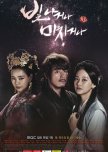
About prince Wang So of Goryeo. A love story with wit, charm & affection. Makjang alert. Toxic, too
First of all: "Shine or Go Crazy" is a love story from head to toe with all the trimmings. Nevertheless, it is also about the dazzling historical figure of Wang So - King Gwangjong from the early hours of the Goryeo era. Thus it is a beautiful character study about the young prince, who at last became king, but who had by far not been the preferred prince of choice as far as the future throne was concerned. How did HE happen to become not only king but such an outstanding one as well - one who is NOT automatically (as so often) a jumping jack for his ministers, eunuchs and palace ladies? Who or what motivated and inspired his rather grounded, almost visionary, innovative, citizen-oriented policies?This KDrama offers a (possible) answer to history, as well as an epic love story, playfully sprinkling disguise of origin and confusion of gender.
----------------- SIDE NOTE: --- Wang So, 4th son of Goryeo King Wang Geon, and later King Gwangjong
During his 26-year reign at the end of the first millennium, King Gwangjong laid solid foundations for the next four centuries. To this end, he introduced some popular reforms for the common people (yet unpopular among the nobility). Above all, these concerned slavery. Additionally he instituted the national civil service exam, which allowed people to serve the country according to their ability. Introduced during his reign, too, were so-called "Daebi-won" - medical centers for the free care of the poor. Finally, he secured the borders of the empire with military measures. Throughout, he consistently had to deal with opponing noblemen ... and eliminated them uncompromisingly. "Shine or Go Crazy" is a dignified multimedia monument to his rulership, that in general rather focused on the needs of his ordinary citizens than aristocracy.
The KDrama "Shine or Go Crazy" (as well as "Moon Lovers" who deals with King Gwangjong, too), offers a conclusive explanation for this King´s particular career. Whether this is historically justified by sources, I could not find out yet. In any case, Prince Wang So becomes tangible and understandable with the help of this fictional setting: The KDramas tell his story as at a young age being banished from the palace and sent to the mountains - thus hopefully avoiding a bloody prophesy from coming true. There he lived a life beyond the palace intrigues, yet close to nature and its existential everyday struggles for survival. Like that, his everyday life inevitably came quite a bit closer to that of the ordinary people of his time. This socialization in 'freedom' and largely grounded normality shaped him in a completely different way than his (numerous) direct and indirect siblings within the palace walls and thus makes him a resolute and popular monarchical free spirit. At the same time, this lays the right foundation for placing a completely unorthodox, unexpected and inspiring commoner´s love at his emotional side. Like that the fictional K-Drama helps to on the one hand understand the sharp edges of his disappointment because of parental rejection as well as his self-doubt due to his curse. On the other hand, however, this is balanced by down-to-earth experience of authentic affection and love. Historically true or not, the extrordinary historic personality of prince Wang So is painted in an impressively tangible, comprehensible way.
------------------- SIDE NOTE --- Trading at the time ---
An aspect of historical detail that's (in general rarely) brought into focus in "Shine or Go Crazy", too, is the importance of thriving international trade at the end of the first millennium. Throughout Korean history, life on the peninsula (not only, but also in KDrama) is rather isolated and self-centered. In this story, at least, business relationships with the immediate neighbors and with the rest of the world are given some space, at least to some extent.
-------------------- SIDE NOTE --- Balhae / Late Balhae
Also rarely a topic in the focus of KDrama is the Korean history BEFORE Goryeo - the time of the three kingdoms Silla, Goguryeo and Baekje. In "Shine or Go Crazy," the female protagonist is a princess from the Late Balhae Kingdom in what is now Manchuria. This dates back to one of five kingdoms that in 37 BC united to form the kingdom of Goguryeo. The first Goryeo King Wang Geon (posthumously Taejo) at his time attempted to reconquer the former territories of the original Goguryeo Empire and thus set his kingdom on proven, solid ground. Balhae being one of them, had previously fallen victim to the Para-Mongolian Kitan. Some (many) Koreans from ancient Goguryeo, who formed the ruling Balhaen elite, escaped to Goryeo - with the crown prince, the nobles and parts of the population. The female lead is set in this context (and also personally associated with an alarming (fictitious) prophecy regarding the future of her people.)
------------------------------------------------------------------------------------------------------------------
Back to the (love) story between the 4th son of Goryeo King Wang Geon and the Balhaean princess, who is an independent prosperous business woman.
In proven KDrama style, there are subplots with their own stories and characters with their own motives, who courageously get involved in the (love) life of Prince Wang So. The political stage is intransigently characterized by malevolent power intrigues. There aren´t any scruples anywhere. Upright people hardly exist, loyalty and dependence being mixed up and confused. There's a lot of bad stuff going on everywhere. It gets pretty ´toxic´, too.
Set in this context is the affectionately and also humourously told relationship of young prince Wang So with a smart, proficient, quite self-confident lady in a double role in disguise as young man. These encounters inspire and enhance Wang So´s pragmatic world view. The dynamic between them is fun to watch - with wit and charm, since his queen of hearts is sometimes hidden behind a veil and sometimes in men's clothes. At times, Wang So has to seriously doubt his gender orientation (... not that this would have deterred him...).
Ah. Yes. The ending... Reviews I had read often blamed the ending. I was ready for the worst. Probably that was a good thing. Like that I was pleasantly surprised as I had expected even worse. In fact, whether I liked it or not, the ending made quite a lot of sense to me. (After all, this is about a historical character - the prince becomes king and has an archetypal task that is greater than himself - during his reign, Gwangjong sets the course for future generations.) Nevertheless, KDrama land even got us a little candy at the very end, too.
My criticism, however, refers to the soundtrack! Unfortunately, this is the first time I definitely have to complain! Shallow songs can have their time, I don´t mind. But in this case (at least in my acustic sound system) as soon as romantic vibes gently started to develop, an inappropriately dull, meaningless song (in my perception) acustically dominated the scene and thus insensitively destroyed each and every moment (again and again). A real shame! (I would like to hope, that this was just due to my technical device...)
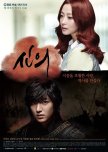
An epic historic love story, playing with time and space. Waggish. Affecting. Wonderful acting.
A special dramaturgical drive given by time travel and parallel worlds are quite common in KDrama. Thus contrasting perspectives from different backgrounds quite regulararly add unconventional fun and extra thrill to story dynamics.Additionally, KDramas like to chose a historically exotic context for its intriguing and romantic stories, while still giving them an epic scope. Even if not always historically exact, these plots offer plenty of material for drama and at the same time convey historical facts and heroes in a colorful dress. Epochal personalities and their impact come to life again. As Korean history goes far back in time, there are yet many more heroic stories to be told...
"Faith or the Great Doctor" combines both, the historical approach as well as playing with time and space in one story. In fact, history is thus presented even more funny and colourfully. On the historic side, this KDrama revolves around the legendary General Choe Yeong (1316-1388) who went down in history as the protector of the Goryeo Empire and its royal family. Incidentally, this is not the only KDrama that has been dedicated to him to date... As early as 1983, a series monument was erected for him in "Gyegook" and "Chu Dong Mama". He is also featured in "Tears of the Dragon" (1998), "Shin Don" (2006), "The Great Seer" (2012), "Jung Dojeon" (2014), and "Six Flying Dragons" (2016). You guessed it, he´s a real hero for the Korean Peninsula.
-------------------- SIDE NOTE: --- General Choe Yeong ---
Known for his strength from an early age, the son of a civil servant learned martial arts and studied books on military strategy. Over the centuries he had finally achieved the status of legendary protector of the Goryeo dynasty. Although he was also exiled for 6 years due to intrigues, in the course of his life this did not prevent him from fighting around 80 more battles in the service of the king. He lost his last battle against his former brother-in-arms, General Yi Seonggye, when he seized power in a coup d'etat in 1388 during the Battle of Liaodong. This was also the birth of the Joseon Dynasty.
-----------------------------------------------------------
"Faith or the Great Doctor" traces the path and integer character of Choe Yeong, whose motto has been handed down as "consider gold as if it were a stone". It´s obviously not pure poetic freedom when he is portrayed as sincere, stylish and gallant. And also does his combative superiority not seem exaggerated - his skills are historically documented. The focus of this KDrama is rather on the young general. He is not only presented as a strong leader, but as a young man who falls in love with a woman who is almost 10 years older. This (fictional) constellation offers some extra driving dynamics to the romance - as well as a comparably pleasant maturity at times as well.
The title plays with the different language styles in Korean - the old Hanja, which was written in Chinese characters until 1443, and the Hangul writing, which was newly created during the Joseon dynasty (and in which many Hanja terms have been preserved to this day.) So the original title "Sin-ui" may be understood both as 'trust in law and order' or as 'gifted healer'. In this sense, the title not only values Choe Yeong, the protector of law and order in the Goyeo Empire (refering to the Hanja translation), but also the gifted female healer (refering to the meaning in Hangul) - Eun Soo, a cosmetic surgeon from Seoul in 2012.
In the midst of waggish and heartbeat, this epic love story with all sorts of dramatic twists and turns absorbs within an eventful chapter of Korean history. The contrasts between modern and traditional medicine, somehow clashing in the middle of the 14th century, as well as between the almost rebellious, outrageous self-confidence of the by modern Seoul life spoiled doctor Eun Hoo and the ancient court of the Goryeo royal family guarantee 24 episodes of evocative entertainment.
"Faith or the Great Doctor" is an epic historic drama and at the same time playing with time and space. With two wonderful leading actors and more. The perfect mix for an epic Rom+/-Com.

A merciless play with people's fears. Witch-hunt revisited. Gloomy. Upsetting. Horror with no escape
"The Netflix production "Hellbound" started even more successfully on the global streaming platform in November 2021 than "Squid Game". Dystopias (stories about gloomy visions of the future) these days obviously hit a sore spot in the global mass consciousness - the fear of what still is to come, considering that nothing will be the way it used to be....Accordingly, "Hellbound" generally plays with people's fears. The characters in the story also play with people's fears - here in the face of a hell on earth that is spreading inexorably, flanked by a modern form of witch hunts and establishing a new order in which there is little room for hope and light. Because even as a reward for a righteous life, only death awaits in the end. At best, you don´t have to be ashamed and getting ridiculed of it.
The focus for the 'not righteous' is a heavenly or better hellish special commando, which arrives from the afterlife in the form of huge hell gorillas and stages a small earthly hellfire from human bones. No less shocking is the moment that meticulously announces the day and hour of this death in advance.
Rarely have there been so many crazy, delusional people in KDrama (here namely in the realm of the sect). The number of truly honest people can be counted on one hand. And in between there is the vast majority of the terrified masses, blinded and tamed by the New Truth Society's threats sold as hope...
The prospects are really daunting. Not just unearthly prophecy and execution of the death sentence for the shameful, despicable sinners. Even more actually what this scenario does to the people. There is the group of the "arrowhead" who, already sort of detached from any aspect humanity. Their members receive the carte blanche from the ordained sect priests to use the brute force and terror in order to carry out a multimedia-fuelled new edition of witch hunts. They are allowed to live out their wildest violent fantasies . And then there are the would-be ´gentlemen´ (and ´ladies´), CEOs and high priests of the New Truth Society, who submit their new 'commandments' to the people, and the VIPs who solemnly attend the celestial court processes live and in the first row...
Eventually, it can´t get any worse than that. "Hellbound" effortlessly catapulted humanity back into the deepest Middle Ages - yet in the midst of the modern, high-tech 21st century. Business with sin is very popular there. From now on it is no longer about the hope of eternal life (in the hereafter), but merely about not to unnecessarily embarrass yourself as a sinner in the face of the inevitable earthly death...
For me, "Hellbound" is highly ambivalent. It's done great again. Ecellent actors. Exciting story. Upsetting, because maybe not so absurd in terms of social dynamics... But do you really want to/do you have to look at it? There's practically nothing positive coming out of it. Even the hopeful spark at the end remains under a hood of fear and horror and somehow doesn't really find its way back to the light... (A 2nd season is in discussion... maybe then? Or just more fear and horror from which there is no escape?)

Showing simple normalcy for generations of SK women being gagged&bound by society's endemic sexism
"Kim Ji-young: Born 1982" puts every die-hard Korea fan through their paces: how far does the love for country and culture actually go? The KMovie also does away with any illusion surrounding romanticized and socially idealized yearnings that revolve around the concept of 'in love-engaged-married-happy family'."Kim Ji-young: Born 1982" broke the 2 million mark worldwide as a bestseller (by author Cho Nam-joo). It is also considered the most borrowed book in two consecutive years after publication. The KMovie was also extremely successful. In South Korea, between October 2019 and November 2020 around 3.6 million people went to the movies to watch. In addition, numerous prizes were awarded throughout Asia.
Calmly, unagitatedly and almost objectively distant, the camera focuses on the ordinary life of a typical South Korean woman, wife and mother in her 30s. Actually, she doing quite well. We accompany her in her everyday life between laundry and kindergarten, with her (actually quite attentive, loving) husband, with her in-laws, with her family of origin, with friends, with flashbacks of her childhood and at work, and finally with the therapist. This could all be any live of many a South Korean woman. That's not special at all. It's so cruelly normal that it even hurts. By showing simple normalcy, the story also becomes an outcry for several generations of women gagged and bound by society's endemic sexism.
Gagged and tied up by such a conservative, rigid, discriminatory socialization that is literally burned into flesh, so hardly anybody even considers alternative role models and self-images. There is a lack of role models that give women something like self-love and self-confidence that go beyond identifying with role expectations by family and society. Women somehow grow up as prisoners of those restrictive expectations - in a prison with doors, that technically are not closed, yet in practice barricaded by the mercilessly experienced sexism since early childhood. Accordingly, there is a lack of awareness of human dignity beyond gender roles. For women and men alike. And as we all know, such awareness would be the first path to any change...
In this respect, "Kim Ji-young: Born in 1982" holds up a merciless mirror in a calm, objective and non-judgmental manner, which focuses on the great evil that everyone simply takes for granted. Apparently, around 68 percent of cinemagoers were women. At least, the other 32 percent were men, supposedly.
In one of the last scenes, (which, like all the others in the film, gains its power from the simple, unquestioned und yet unbelievable normality) the underlying emotional muteness is finally allowed to speak up - not loudly and rudely though, but objectively subjectively and, despite all the justified anger, consistently in all modesty calmly, too.
In the face of the spilled coffee, instead of accepting the comments and accusations of her social environment with shame, concern and apologetic words, the FL has her outspoken objections. She eventually stands up for herself... actually, you should think, quite simply, as if it were a matter of course. And yet: downright unheard of. Because: Shameless in the best sense of the word... she no longer lets others shame her for what and who she is. She is slowly but surely developing a somewhat healthy approach to her own self-confidence as a person with self-worth and self-love beyond gender - a person who cannot be reduced by tradition to just a family concerned role concept within a hierarchical society. From this, the FL nurtures a new attitude towards those who traditionally believe they have more value in the social ranking.
Just a comparatively small, handy book; just a two hour movie. The story of Kim Ji-young, born in 1982, has sparked a lot of discussion throughout South Korea. The common, everyday (South Korean) madness shown knows how to touch and quietly infuriate. For me in faraway Germany, too, the KMovie wasn't boring for a minute.
-------------------------------------------------------
--- Outlook ---
'If everyone would act up like that... where would we end up?' - In this sense, the book and the film also led to a horrified outcry within conservative circles in the country. The main actors in the KMovie, for example, had to endure hateful comments for even taking part in it. Just this factual inventory of normal madness of just about every woman in the supposedly modern, innovative South Korea got conservative minds going...
...on the other hand, women affected finally received the balm of cross-class compassion, which for a moment opened up the space for solidary, cross-generational sisterhood. As insignificantly common and simple as Kim Ji-young, born in 1982, may be, the social impact was equally great - the consistently overlooked, completely disregarded reality that has been systematically carried out for countless generations out of principle and tradition, discrimination against (in this specific case) South Korean women.
South Korean society is already shrinking. Earlier than expected. And much faster than expected. No wonder.
Women born in the 1980s by now increasingly began to feel painful about their corsets. A milestone!
Those who were born in the 1990s and 2000s, some among them started to increasingly openly dare to actively shake up the social corset - simply by no longer accepting their 'certain' female role. Another milestone!
However, there is still a long way between shaking up and breaking out or even redefining. Eventually, women can only take this step together with men, who also urgently need to work on their role models, their attitude towards women and a new social self-image. Only then can the shrinking of South Korean society be stopped - a shrinking that, in my eyes, is an expression of a massive imbalance between innovative, turbo-capitalist high-speed in the global fast lane on the one hand, and an ignorant, sexist conservatism on the other, which acts like a lead foot screwed onto the brakes. Nevertheless, growing forces are apparently pushing for an urgently needed, integral, truly progressive transformation of existing values.

Us walking along in those indifferent (?) shoes of Han Gong-ju is the great power of this KMovie
Among independent South Korean film productions, “Han Gong-ju” is considered one of the most successful to date. In fact, the number of viewers exploded within the first week - through word of mouth alone. In addition to this vote with feet, there were consistently positive (national and international) film reviews and awards."Han Gong-ju" offers relentlessly haunting independent KMovie quality, frugal, not easy to digest, yet calmly, subtly and sensitively told, too. Behind the seemingly indifferent attitude of the protagonist, highly concentrated emotional force blazes subliminally, which is released less in the protagonist herself than within the audience. By the way, the story is based on a true story. (More background below - but that's quite a spoiler... so if you want to watch the film, you might want to read it afterwards!)
The KMovie tells the story of the fictional Hang Gong-ju in a rather reserved manner. We initially follow the girl without knowing what it is about or what she actually has experienced. Over time we learn to understand, or better: vaguely guess what she was and is going through. Over 112 minutes we see and experience the world vaguely through her eyes. This is a great power of this KMovie. The girl´s everyday world is fundamentally threatening, unwelcoming and cold, almost merciless. Han Gong-ju herself is tough and clear, demure and mostly indifferent. (Hang Gong-ju may by now have learned to face her world with indifference, but we as audience? We may feel differently here and there…) Nevertheless, she also has learned to create islands in her life that offer at least some minimalist beauty, joy and perspective.
What happened and is happening to Hang-Gong-ju admits of no excuse. But unfortunately it happens everywhere. Not just in South Korea. Unfortunately, again and again, more and more often. *
The role of adults is also inexcusable. It is we so-called 'adults' who lay, or should lay, the foundation for a sense of justice in the upbringing of our children. However, in this story (and its true background) it failed spectacularly. On several fronts. The results can be considered rather grim.
As solid and reliable role models that 'we' adults are/should be: how do we actually relate to right and wrong? Parents who would rather protect their beloved children from the consequence of their (any) actions, than confront them with it – yes, that's understandable. But will the 'children' learn from their mistakes in the future (without any true feeling of guilt about having done something wrong)? So that they might not replay their misbehaviour in the future? Rather not. However, if everyone prefers to proclaim an exception rule for themselves (and their loved ones), that cannot work out well. So it always ends in fighting and stabbing... by any means.
The irony: For cinema and television this is actually quite wonderful, because thus there are always new, stirring stories to tell. In the case of "Han Gong-ju", fortunately the entertainment gain does not come from dramatically exaggerated voyeurism, but rather from the fact that we walk a part of the truly sobering track in those indifferent (?) shoes of Han Gong-ju. By doing so, clues putting the (difficult to digest) puzzle together accumulate...
Lee Su-jin's KMovie is consistently serious, unpretentious and at the same time convincingly authentic in the presentation of the protagonist. Chun Woo-hee in her difficult role as Han Gong-ju is also outstanding and masterly in this context!
-------------------------------------------------- -------------------------------------
SIDE NOTE: --- Events at Miryang Middle School in 2004 ---
Over a period of just under a year, at least 44 (but possibly more than 120) high school students repeatedly raped three 13 to 17 year old girls and filmed them in order to blackmail the victims. The gang rapes obviously happened as a purely entertaining pastime for the boys.
The first 14-year-old victim was blackmailed with the film recording to bring her younger sister and her older cousin to the subsequent 'meetings', who then also became victims of renewed gang rape. In addition, the victims were forced to pay so that the footage would not be published. There may have been even more victims.
As unforgivable as these actions are, dealing with them was even more unforgivable. After the girls' aunt reported the case, of 44 clearly identified repeat offenders, only three were initially actually arrested. Due to massive public pressure, 9 more were taken into custody and a further 29 were officially arrested but not taken into custody.
There were no serious consequences for the perpetrators. On the contrary, the victims became victims again! On the one hand, they suffered psychological damage during the interrogation due to insensitive, confrontational confrontations and verbally abusive male officers (even though the victims had expressly asked for female officers). On the other hand, parents tried to force the actual role of perpetrator on the victims due to provocative behavior.
Finally, the defenders pointed out that some of the boys are already about to enlist in respectable universities and would soon contribute to the shining future of the city. In general, the parents of the perpetrators managed to build up pressure in various directions and also helped with money to box their boys out of the annoying situation. Among the victims' parents, on the other hand, one father unforgivably exploited his daughter's predicament for his own benefit. Ultimately, only 5 boys were tried in juvenile court. Without serious consequences. They are now probably fathers themselves and are firmly established in their careers.
In the meantime, this and that may have changed legally (and also when it comes to investigating), in South Korea and Germany and in other countries, too. But still, in current cases of juvenile sexual offenses, to date a strong tendency among parents here and there is increasing to wanting to box out their loved ones by all means possible, regardless of the losses. Far too rarely is attention paid to reflecting to their sons (and/or daughters) when they in fact tremendously misbehaved, that, yes, they are still loved and ok, BUT THEIR ACTING IS NOT OK at all. As a matter of course they will have to face the consequences – as serious misconduct that the social community we live in does not tolerate.
… However, our problem is: 'we' obviously DO tolerate it... Over and over again.
Sadly, in this respect, the KMovie “Han Gong-ju” is as topical as it was in 2013.
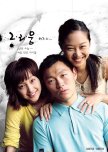
Anti-heroes. Down to earth. Authentic. Harsh. Compassionate. No Cinderella story, yet a love story.
I stumbled across this comparatively 'old' KDrama (2002) because of actress Gong Hyo-Jin. But actually here particularly Lee Na-young and Yang Dong-geun impressed me with their strong and down-to-earth performance. Once again I discovered a little gem of early KDrama art.Rather tranquil. True to life. Authentic. No fairy tale. No Cinderella story. No power games of the mighty, but simple everyday life of anti-heroes. Yes, down to earth. Very. I was delighted. This KDrama - like "My Mister" or "When the Camellia Blooms" - is centred around a quite authentic, ordinary world. Not spectacular. Neither in action, nor in scenery. The story is also not about the rich, beautiful, successful people that are always welcome, but about those who are less noticed (in the media): about ordinary people who didn´t have an excellent education, yet earn their money somehow. It is about a world comparably most people unfortunately live in - about their worries, hardships and, if it can´t be avoided, illnesses, too.
In its centre: a young, inconsiderate, unwieldy pickpocket who is confronted with the diagnosis of brain tumor. It is about the people in his immediate environment: family, friends, girlfriends, police. About a love traingle. About choices in life. Reconsideration, too. That's not really 'exciting'. But touching. Unspectacularly impressive. A mirror of compassion and humanity.
"Ruler of your own World" dates back to the early days of KWave. At the time, this KDrama was not as successful (also internationally) as i.e. the productions of the "Endless Love Series". However, it was highly valued and appreciated in its own country for the authentic story (with comparably hardly in KDrama otherwise frequently elaborated makjang). "Ruler of your own World" is considered the ´best´ serial production of 2002 (vs. "Winter Sonata" as the most ´successful´ of the same year.)

Sensitive and at the same time ruthless portrayal of child abuse and its traumatizing effect
"Miss Baek" is a KMovie about child abuse. Sensitively, cautiously and at the same time ruthlessly, it portrays the example of two 'victims' - a young girl and a grown up woman (actually also a man). It shows how the system prefers to helplessly look the other way, leaving the children alone in their family hell. It also illustrates how this traumatization affects their future lives, remaining trapped in their frightening dark history, still vividly present for the rest of their lifes.Han Si-mi has received multiple awards for her performance as Miss Baek. But also Kim Si-a in the role of little Ji-eun is just incredible. And the rest of the cast and production, too. Also thank you for the consistently tranquil, unexcited simplicity as well as a to the point, no-frills narration.
Highly valuable. By the way, the story is based on a true event.
------------------------- SIDE NOTE: --- Child abuse in South Korea ---
The cane in schools has been officially banned in South Korea since 2010. However, thrashing at home is another issue. Among the cases of child abuse confirmed by the police, more than 80 percent can be traced back to the biological parents as the perpetrators. To this, add the dark figure. Accurate statistics on the prevalence and frequency of violence against children are difficult to obtain, since the police, ministries, child protection centres, independent agencies, etc. each compile their own statistics, which are based on estimated numbers.
Many South Korean parents grew up like that themselves ... and still belief that children are the extended selves of the parents, kind of - not individual separate beings. Social focus is not on the rights of the children, but more so on those of the parents. Upbringing is primarily the private affair of parents and not a matter of legal jurisdiction. In this context there is often talk of the "stick of love". In fact, many parents believe that thrashing strengthens their children's character while showing them how much they are loved.
In many European countries this no less than abuse. And fortunately there is a growing awareness of this in South Korea as well. In media representation again and again one encounters scenes of child abuse, e.g. in KDrama and KMovie. It is common. However, fortunately, it starts to be more and more common, too, that this kind of violence is being socially confronted as part of the storytelling... Statstically, the number of cases with serious domestic abuse being investigated by the police is increasing. Including cases in which parents abuse their children to death. This does not imply that child abuse is increasing, rather that more cases are being reported. An encouraging sign. It gives hope that the dominance of traditional (and often abusing) parenting concepts is slowly crumbling.

Despite all the catfights there is a deeper grounding to the story. Intelligent. Emotional. Opaque.
"Battle for Happiness" is based on a novel, the author herself having written the script for its KDrama version on PayTV, too. The story offers refreshing substance - with insight into honest emotional worlds underneath a shimmering dishonest surface. Powerful, intense women, who also have their sore, hidden wounds, shaping a surprisingly powerful story. Hats off!The story is set in the elite world of elite Gangnam mothers in the elite (fictional) Gangnam housing block Herinity. But even though the ladies may have made it into the upper league of society by marrying a lawyer or doctor or having wealth in some other way, they are still far from happy - even if they do almost everything to make it look as if...
Perhaps one could say that the KDrama is (again) a reckoning with the dubious concept that gives preference to the radiant, shimmering external appearance over truthful, sincere substance. But that's quite abstract. Actually, “Battle for Happiness” is rather precise. The battles are taking place in the mud of the protagonists' hidden secrets and weaknesses. That is dirty. That is mean. That is malicious. That is cruel. But that's what the life of those Gangnam mothers is all about. The societal backdrop is characterized by the overall social pressure to perform and compete for pole position in the race for the top spots in the social pyramid. But this is actually just the backdrop. It's actually less about the children. They are ornaments of their mothers. The mothers, on the other hand, are in the spotlight - wealthy, frighteningly powerful, influential women. Vulnerable people, nonetheless.
Admittedly, at the beginning I was tempted drop – those bitches! So false, so dishonest, so calculating, it was almost unbearable... The social media in their function, to spice up one´s own life a little more gloriously on the outside, are elaborately integrated into the overall dramaturgical structure. However, I stuck with “Battle for Happiness” because despite all the catfights there is a deeper grounding to the story, whose charisma can eventually fully unfold.
In fact, I'm glad I stuck with it, because the story offers an exciting rollercoaster ride of assumptions and suspicions. "Battle of Happiness" suddenly turns out to be a captivating crime thriller in which an inconspicuous private person takes the investigation into her own (unexperienced and sometimes naïve, impulsive) hands. Yet, even more appealing to me is the naturalness in which this KDrama gives a hand for compassion - even with the worst of the she-devils: the lady, who as the incarnated princess of hell in designer clothes initially got people´s minds running wild...
It´s the ladies, who rock the show. They are mothers, wives or single. In any case, you can't get past them. And they, for their part, cannot avoid facing their own sore wounds, which are catching up with them one by one. We consistently dig deeper into the hidden emotional worlds of those women (plus also a couple of men and some children). They must face their personal emotional battles, even if they don´t want to. In the best case scenario, they become their actual battles for happiness, as they lead to their very personal questions and truths - what is REALLY crucial in my life?
There is a dubious mathematical equation circulating among those ladies that goes something like this: 'The amount of misfortune I cause someone else becomes a factor for my personal happiness.' Well, even if I'm myself not great at math: If you multiply whatsoever by zero, as far as I know, zero still remains, isn´t it... So eventually, those ladies are forced to work on THIS point in the equation (the zero!)...
...and some of them actually take advantage of this opportunity as an outsider penetrates the aloof world of the Gangnam ladies. One, who doesn't think much of all the elitist concepts of happiness and competition, but instead innocently keeps looking for the perpetrator.
I wouldn't have thought so at first, but in my opinion "Battle of Happiness" is clearly one of the better, more substantial productions that 2023 has to offer so far. Comparisons with existing KDrama productions that are set in a similar milieu and/or wade in the mud of the glittering elite may perhaps come to mind. But "Battle of Happiness" tells its own story! And in my opinion it is definitely worth watching. (...if you are not looking for Romance or Oppas or Comedy…)
Most of us may never get near such exclusive worlds. However, wanting to fool others (and ourselves), feeling better when others are feeling worse, sometimes doing something to others that we wouldn't want to be done to yourself... hardly anyone might be immune to these human impulses. If we take away the exclusive luxury world, from which many may easily distance themselves, then we're still left with the beastly temptation that may linger in all of us. Maybe/hopefully we just don't let the beast in us out of the bag so uninhibitedly...
So I could summarize: I appreciate the intelligent, yet still highly emotional approach and the opaque processing of those different relationship dynamics between the protagonists.

A shark may not be able to generate suction, but "Shark" can very well do so !
The title "is an allegory and a leitmotif - be it the original title "Shark" oder the sometimes internationally also used title "Don´t Look Back: The Legend of Orpheus".The latter not only alludes to the ancient legend of Orpheus, but also to Marc Chagall's painting of the same name, which can be found in the KDrama as a leitmotif, too. It basically describes what this is about. As far as the mythology is concerned: Ultimately, Orpheus never gets his great love Eurydice back - even as tries to return with her from the realm of the dead, he unfortunately doesn't manage to do without "looking back" (the condition for the rescue to be successful). In relation to the story of the KDrama, this could mean: the protagonist would have to give up his revenge - his being stuck in the past. And that brings us to the core of the story: revenge.
The original title "Shark" refers to a second leitmotif: Since childhood the protagonist feels a great affinity and sympathy for this particular predatory fish. Ocean sharks must always be on the move. Their mouth remains open so that fresh, oxygen-rich water can reach their gills and they are able to ´breathe´. Not moving means no fresh oxygen supply and thus their certain death. This implies an inevitable activity at all times - consequently they are always dangerous. Ocean sharks are loners, too. At most they join together in groups for hunting. In this respect, the story is set in the world of powerful, highly influential Jaebeol, whose machinations tremendously drive the Wheel of Fortune. They never stop shaping the world at their will, regardless of the cost. The protagonist courageously competes against one of the really big ones (actually against two). There is plenty of manipulation on all sides - as if you were pulling the strings of puppets. Sometimes one might think of vodoo dolls... Police and lawyers are breathlessly chasing behind the events. (It came at a time when bribery and corruption in South Korean business and politics was still more common and taken for granted than nowaydays. It was only a couple of years later that even the head of state was accused of being part of a shocking network controlled by Jaebeol bribery. To that extent the KDrama was just on spot at its time.)
"Shark" offers a fine study about injustice trying to be compensated by vigilantism. However, making amends is not possible. The protagonist's father is and remains dead. Revenge isn't that easy either, because in the course of his chess moves the protagonist stumbles over truths he didn't expect and a love that could get in the way of revenge plans. (Somehow Orpheus is whispering into the protagonist´s ear: "Do not ´look back´!", e.g. let go of revenge and vigilantism...)
The shark (as an animal) may himself not be able to create suction (for breathing), but the KDrama "Shark" can do so very well. The soundtrack sets the rhythm, the melody burns in, the events take their course and you always want to look around the next bend to see what might happen next. Although the good guy is the bad guy, you're feverishly at his side. And on the side of the bad guys, there are the good guys too. What to do with morals...
"Shark" gives practical insight into the early hours of the Jaebeol and their machinations over time. The roles of their long-term companions, who knew them from the earliest hour before their rise as Jaebeol, are also highlighted (e.g. their companions, today assistants, secretaries, drivers, lawyers, etc.). With those they have come a long way and so the know each other, like no other).
"Shark" is more on a tranquil side and maybe less colourful than other KDramas. Both background and heart of this KDrama with its characteristic tinting are set by the tender childhood love - between the Jaebeol´s grand daughter and the driver´s son... The differentiated side plots also keep viewers on their toes. ... It remains thrilling until the end, when open questions are answered.
Mercilessly the wheel of fortune turns, over 20 episodes. The premonitions of the first scenes are set ´today´. Then, in retrospect, the emotional relationship between the protagonists, what happened back then and where they are coming from is portrayed via their youth experiences, before the today´s storyline is picked up again.
Some call this KDrama a masterpiece. I am one of them.
Yet the whole is as often more than its parts. If you are primarily in it for the romance you might be disappointed in the end. Rather against the setting of this love story the KDrama is giving insights into the careers and backdrop of the shiny Jaebeols´ shady practices. In return on this solid drama-soil the emotionally challenging processes of those two ´associated in love´ unfold...
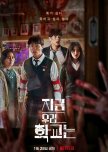
In spite of all the horror and struggle for survival, there is still room for the heart note
"All of Us Are Dead" isn't specific to South Korean culture, but it's not surprising that the story was born on South Korean soil... The story picks up on the sheer horror that South Korean youth are exposed to in the face of their brutal educational system. There, the enormous pressure to perform is higher than almost anywhere else in the world. For some, bullying is one way to reduce stress. The bullied, in turn, are doubly stressed. Other options include withdrawal, drugs, or suicide. South Korean society is largely blind and/or helpless in the face of this. The pressure to perform and, in this context, the psychological suffering of young people seems to be without alternative in view of the nationwide (and worldwide, economic) competition - a price that society has to pay in view of the greater good. And with that, the youngsters are left alone to somehow survive in this merciless world. However, this applies (perhaps not so blatantly) in a similar way to young people in many countries around the world.This is where "All of Us Are Dead" comes in its impressive and striking way.
The original title is something like "Currently at our school", so the focus is actually on the school and their students. In fact, the horror of everyday school life, which is more existential for some and less existential for others, mutates into a horror for everyone. A troubled father wants to create a way for his suicidal son to finally stand up to his bullies. The experiment goes astray. The vicious, zombie-like virus is sweeping the entire city and beyond. Disaster control, state of emergency, martial law - the whole program is needed to get the situation under control. And here, again, the young people are left alone in their existential need.
The story telling and expression of various group and relationship dynamics between the young people represent high-end KDrama quality - intense, powerful, sensitive, excellent. Almost everything is on the table. For me, this is the strength of this KDrama and the reason why worth watching.
Besides the problems, dynamics and approaches of trying to 'master' the threatening epidemic somehow sums up what we have had to go through worldwide in the past 2 years marked by Covid. When the rules are overridden, individuals (those who happen to have something to say) rule against the backdrop of their (helpless) personalities - arbitrary or scientifically based, rational or irrational, mostly driven by fear and from a safe distance and/or on the (argumentatively) safe side. Then real quick nobody takes side of individuals anymore, the big picture being more important...
Seen in this way, "All of Us Are Dead" is a qualitatively demanding KDrama in several respects. In spite of all the horror and struggle for survival, there is still room for the heart note.
However, I would like to emphasize that the virus is turning people into flesh-eating zombies. So the abundance of screaming, rattling, biting, blood-smeared zombie scenes, which simply lack any aesthetics for the eye and ear, is part of the story, too. In general this drama is brutal. This is obviously very popular in the international zeitgeist and thus (being published on the international netflix platform) stagily staged. I would say, brutal details and zombie-screentime could definitely have been less prevailing (in order to still tell the story).


 9
9 38
38 15
15



















